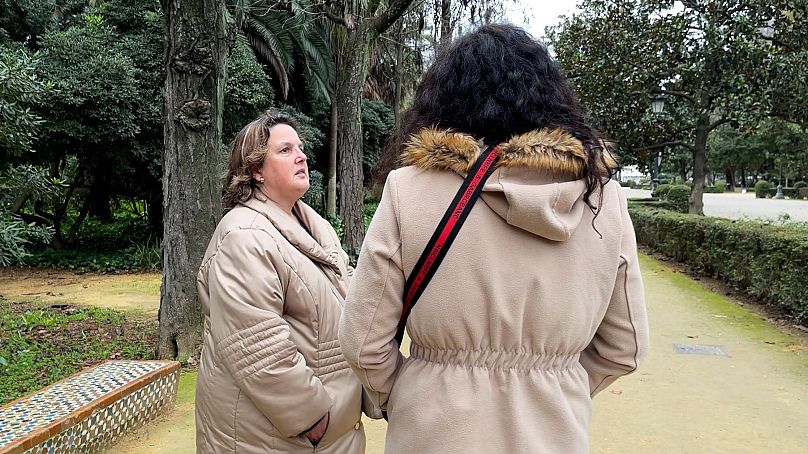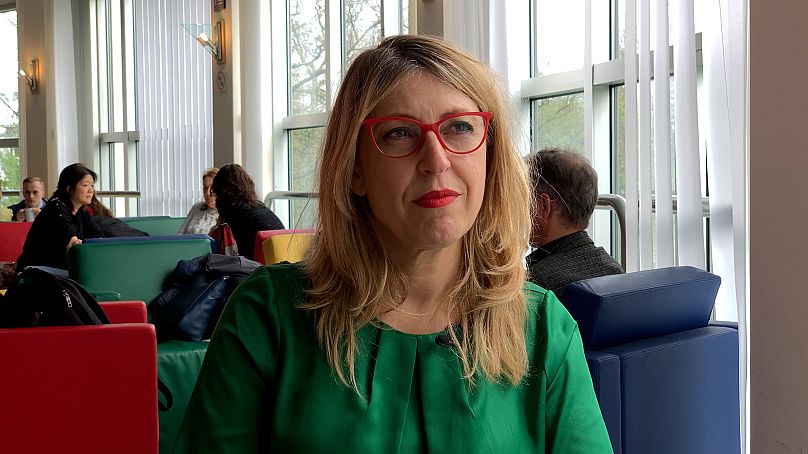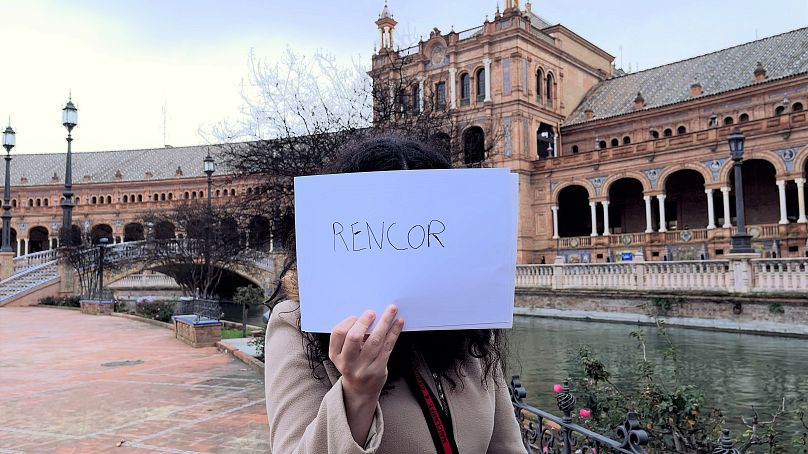
“If you can’t take care of yourself, how will you be able to care for someone else?”
Rosario Ruiz, 53, would always hear this sentence while growing up. Diagnosed with a 67% intellectual disability, her parents could not fathom her being independent – let alone a mother.
“Your disability can pass on to your child through your genes,” they would often repeat to her.
When she turned 20, she fell in love with Antonio, one of her colleagues at the occupational centre in Seville, southern Spain. One day, when talking about their future, both spoke about wanting to have children, so they went to see Rosario’s parents to share the news.
The idea of Rosario being a mother was a shock for her parents, who, advised by their family doctor, decided to have her sterilised.
Forced sterilisation of disabled people was legal in Spain until only two years ago. The law, which allowed sterilisation without consent “in exceptional cases”, was repealed at the end of 2020.
However, the practice remains legal in much of the European Union. It is against the law in only nine countries despite contravening the Istanbul Convention and the International Convention on the Rights of Persons with Disabilities.
Portugal, Hungary and the Czech Republic are the only three Member States that allow sterilisation of minors.
Forced by her parents, Rosario had to undergo an operation to tie her fallopian tubes when she was 20. She was taken to Vírgen del Rocío Hospital, in Seville, without being told what kind of operation she would have to undergo.
Her mother threatened to stop her from seeing Antonio again and to put her in an institution if she refused to go to hospital, so she agreed.
The next day she saw the scar on her body.
“I asked myself: ‘What have they done with my life? Am I useless? Can everyone be a mother except me? Since then, I feel empty every day of my life,” she told Euronews.
The “little affection” she had for her parents died after she was sterilised.
“I don’t have a conversation like father and daughter. I don’t trust anyone anymore, nor do I want to,” she adds.
Three years ago, Rosario managed to get rid of the incapacitation that allowed her parents to decide on absolutely every aspect of her life. However, she is still not completely free.
On weekdays she now has to take care of her 80-year-old father, the same person who thought she was incapable of taking care of anyone.

Europe is on the verge of outlawing
The absence of common legislation in Europe leaves the decision to outlaw the practice of sterilising people with disabilities in the hands of individual Member States.
Only Sweden, Ireland, Belgium, France, Germany, Italy, Slovenia, Poland and Spain criminalise the practice, with Spain being the latest European country to do so.
Malta will soon outlaw the practice too as the government just announced a plan to amend the current law allowing forced sterilisation.
“It is a very cruel form of domination, both of sexuality and reproduction,” María Eugenia Rodríguez Palop, Member of the European Parliament, told Euronews.
The key to ending it lies in Brussels. In July, the European Parliament will debate whether to outlaw the practice – a decision that would be binding for all member states, but has to be later voted on by the European Council.
The whole political spectrum agrees on it, but it’s the legal basis of the new European Directive on combating violence against women which generates conflict.
Rodríguez Palop points out that the legal basis is very narrow because it is based on the European crime of sexual exploitation.
“We are trying to broaden the criminal offences, the concept of aggression and incorporate a link between sexual exploitation and reproductive exploitation”.
There is opposition from some Member States, such as the Czech Republic, Slovakia or Hungary, but also other countries that “aren’t the usual suspects when it comes to going against human rights, such as France, Belgium and Portugal”, in the words of the Spanish MEP.
She sees forced sterilisation as a “very clear case of eugenics” and points out that “eugenics still exist in the 21st century”.

Begging to have children
Carmen – not her real name – had always dreamt of being a mother.
However, her mother’s decision had already been made: Carmen would undergo a tubal ligation to prevent her from having “many children” when she was 20.
Carmen has a 67% intellectual disability and her mother took her to hospital without telling her where she was going. She didn’t know what was going to happen until the doctor explained it, but by then it was too late, as she was already in surgery.
“I was crying and asking them please not to put me to sleep. I was saying please let me have a child, only one. I tried not to fall asleep, but I felt the anaesthesia getting stronger and stronger,” says the 31-year-old.
“When I signed the papers, my vision was blurry because I was already under anaesthesia. I signed without consenting, because when I asked, they just told me to sign it,” she adds.
Her refusal mattered little. As she was under guardianship, her mother, who was her legal guardian, had the last word. From that moment on, their relationship changed completely.
“I feel resentment towards my mother, she has taken away a part of me. It’s very painful to feel that what you wanted most in this world has been taken away from you, without being able to decide,” she says.
Carmen says that 10 years later her mother still justifies her decisions by saying that she did it for her own good. “But every time I see the scar, I feel like dying”.

Governments turn a blind eye
The total number of forced sterilisations carried out in Europe remains unknown, as the issue has always been taboo. There are no official figures that could shed light on it.
Portugal will become the first country to collect official data on forced sterilisations, after their national parliament voted to carry out a study on violence against people with disabilities, which will include these figures.
Despite the lack of data, it is clear to organisations that this abuse is mostly suffered by women.
“In my 20-year career I have only known of one case of sterilisation of a man with intellectual disabilities and I am not sure if it was ever carried out,” says Rubén Parrillo, director of the ATUREM day centre for people with disabilities.
“However, I don’t have enough fingers on my hand to count the number of sterilised women,” he adds.





